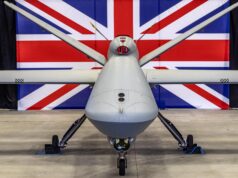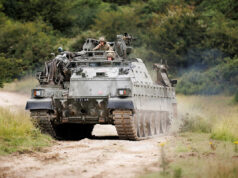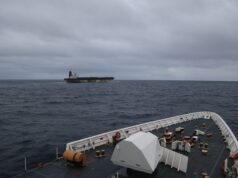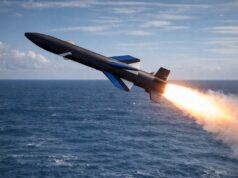During a recent House of Lords debate on the UK’s air defence capabilities, questions surrounding the sufficiency of the defence budget and the strategic balance between homeland security and international commitments took centre stage.
Lord Lancaster of Kimbolton raised concerns about whether the government’s commitment to spend 2.5% of GDP on defence would be enough to address the UK’s defence needs. “Does [the Minister] accept the generally held view that 2.5% is insufficient to deliver a balanced defence budget? … Can he perhaps reassure your Lordships’ House that the aspiration for 2.5% is very much not a ceiling but just a floor?” he asked.
Lord Coaker acknowledged the concern and reiterated the government’s policy, stating, “We are committed to the 2.5% … Air defence will have to play an important part in our defence in the future, whatever level of budget we arrive at.”
Lord Anderson of Swansea turned the discussion towards the UK’s strategic focus, highlighting vulnerabilities in missile defence and questioning whether the UK should prioritise homeland security over its tilt to the Indo-Pacific. He suggested drawing lessons from Israel’s Iron Dome system. “Perhaps we should take advice from the Israelis, with their Iron Dome, about how best to do it,” he proposed.
In response, Lord Coaker spoke on the interconnected nature of global conflicts and alliances, asserting the need for a defence posture that addresses threats at home and abroad. “What happens in the Indo-Pacific affects us in Europe; what happens in Europe affects the Indo-Pacific,” he said.
He stressed the importance of partnerships, noting, “Wherever you go in the world, those who stand with us in the defence of freedom understand that there is an indivisibility of conflict, and that is what we need to stand for.”













Since Iron Dome is designed specifically to intercept short range missiles, and we are unlikely to be under artillery attack from France, I’m not sure what useful advice Lord Anderson expects to get regarding that system. The Israelis have at least 3 other systems intended to intercept longer range missiles, all of which rely on US technology. We already have the relevant technological know-how (as demonstrated by Sea Viper), so the issue is entirely around funding. In any case, this is the kind of thing that’s best tackled with a collective NATO response.
People have started using “Iron dome,” as a plural term for all of Israels air defenses collectively. We absolutely have the technology and dare I say it money to employ a layered national air defense system, and previously have had such systems with things like the Bristol Bloodhound along much of the East Coast until the 1990s, but budget constraints and the relatively peaceful and threat free (for Europe) last 30 years have lead to it being neglected. If countries like Romania, Poland, the Netherlands, Germany and Finland are able to fund multiple new batteries of things like Patriot and Arrow 3 we too shouldn’t have an issue; it’s a matter of in government will that will only come about from lobbying and pressure from the public, restructuring part of either the army or air force take responsibility for it in the long term and fully commiting to funding the system and developing it over its life span – not just making it a token short term government PR stunt with limited funding that looks good for a headline but has limited actual impact.
It’s always unwise to read too much into theses ritualistic parliamentary exchanges. But the mention of air defence does chime with Eagle’s comment about Typhoon.
It’s hard to see Robertson recommending as little as 2.5% which is going to cause problems for the government i
The biggest battle our armed forces are facing is getting the funding they need from the treasury.
IMHO 2.5% will never be enough, we need to be looking at 4.0%
The problem with any government is the constant quoting of percentage of GDP. It means nothing. Three per cent of a failing economy can be less than 2.5 per cent of a thriving economy. As ours has already taken a nose dive after Labours budget and throwing money at everything we’ll be very lucky to stay where we are.
I very much agree Geoff, sticking to exactly 2.5% each year, say, might mean a rise in expenditure one year only for cuts the next. Better to state an absolute figure of expenditure in £Bn.
👍
Agree -3.5%-4% would seem both reasonable and necessary.
Take away everything that has been added to the defence budget (deterrence, etc) and I would be surprised if we are spending anymore than 1% at the moment.
The UK armed forces have never been as poorly equipped and ‘manned’ since pre WWII.
To get us back to a sustained fighting capability will take at least 5% of GDP and ten years (and that is being optimistic).
I read very recently that if you strip out the deterrent and ancillary costs such as pensions the actual figure we are spending on the fighting forces and the necessary support is 1.6% of GDP. Given that every time the chancellor or the PM speak they bang on about how broke the country is (it’s everyone’s fault but ours) the chances of getting even close to a meaningful amount will be quite low. What will be needed to move government and the treasury off top dead centre will be a very forceful report from the SDR team, coupled with more threats from the Russians.
Deterrence isn’t an add on. Money spent on pensions, Ukraine, on operations, on security, on the massive increase in CASD renewal expenditure, these are the budgetary add-ons that suck the money out of conventional capability and hollow out the front-line services. I reckoned spend on UK conventional defence capability was around 1.6% GDP until I saw the equipment figures in 2023 that apportioned 40/60 between nuclear and conventional. Now I think it’s closer to 1.3%.
On top of that we have to ask what’s the short-term spend that will impact during the next two financial years, and what the longer term spend that will mature over the next couple of decades. I have no estimates for that all. However, it’s pretty obvious that as the danger of war increases a shift in lond term to short term is in order.
Bill, Tobias Ellwood said in a 7/1/25 article in the Daily Mail, that the non-nuclear component of our defence budget is ‘around 1.6%’ of GDP.
The government go on about putting defence up from 2.3 to 2.5 GDP has if it’s really going to make a deference it’s no great shakes really , in these times it should be at 4% .We all know this won’t happen I’ll go and get my coat now before I Get shouted at . 🙄
There is no more money for defence in a society where everything is a priority. And for Labour, everything is a priority: climate change, foreign aid, all the domestic priorities … defence ranks way down the list … way down. Despite all the rhetoric, the elite also does not believe that there is a serious Russian threat. They do not believe that Russia will ever attack a 32-member alliance, led by the United States. … so why spend more on defence when those are the overarching perceptions?
While HMG may go on about spending 2.3% of GDP on defence, I believe that conventional defence spending is only around 1.6% of GDP which puts us down near the bottom of conventional defence spending in NATO. So far as the SDR is concerned, the committee’s terms of reference require it to work within current defence spending projections so not much hope there either.
Spoke to a train manager on my journey down to Cumbria from Euston. Beautiful lass from Wexford, she had served in the Gardai and said she had looked at Civil Service jobs and realised how underpaid we are and then said, “we are overpaid, although we earn our money – talked a potential suicide off a platform edge earlier – wages are a mess in England.”
She has a point. Cleaning supervisors at Sellafield on over £70k, is one example.
Wage inflation needs to be tackled in the UK, it will take a very determined Govt to address the issue and simply tell people, you need to take a pay cut, and that includes pensioners.
Then, we can increase the Defence budget.
Any takers?
The defence budget is adequate, its the way we spend it that’s wrong. We don’t get enough bang for our buck. But we do have an awful lot of civil servants – 67,000 of them in the MoD. That seems to reassure the politicians – when the rest of us want more ships, more tanks, more warplanes, more artillery and more soldiers.
All time from the 80,s pressure over the defence budget , it,s pathetic.
I agree that 2.5% should be the new floor, not the new ceiling. More money is definitely needed, but we need also need to spend the money we have more effectively. We spend more than Japan ($65 billion USD vs $55 Bn USD) but we have fewer everything; soldiers, tanks, ships, aircraft, submarines etc. We don’t seem to get much (except Civil Servants?) for our money. Didn’t the MOD absorb the cost of the nuclear deterrent (they used to pay for the day to day?) from the Treasury? If so, did the budget go up to absorb these costs, or was the money merely raided from the regular force budget magnifying the shortages?
(a) 2.5% is not enough
(b) it’s unlikely to increase while interest on national debt costs 7% of GDP
Press suggestion today that deferring the increase in defence spending to 2.5% until 2030 could be a response to the increase in UK borrowing costs